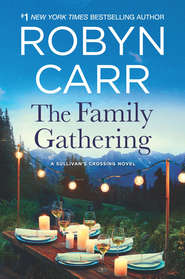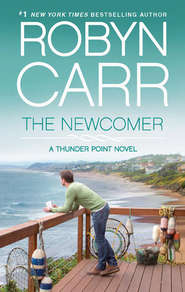По всем вопросам обращайтесь на: info@litportal.ru
(©) 2003-2024.
✖
A Virgin River Christmas
Автор
Год написания книги
2019
Настройки чтения
Размер шрифта
Высота строк
Поля
He looked back at her face and his expression was much more tender. “I’m Jack Sheridan,” he said. “My wife, Mel. That’s Paige,” he said, nodding toward the younger woman. “And Hope McCrea, town busybody.” He put out his hand to Marcie.
She placed hers in his. “Marcie Sullivan,” she said.
“Why are you looking for this marine?” Jack asked.
“Long story,” she said. “A friend of my late husband. I’m sure he doesn’t look like this anymore—he had some injuries. There’s a scar down his left cheek and on that same side, no eyebrow. And he probably has a beard. He did the last time he was seen, about three or four years ago.”
“No shortage of beards around here,” Jack said. “Lumber country—men get a little scruffy-looking sometimes.”
“But he could’ve changed in other ways, too. Like—he’s older. Thirty-five now—that picture was taken when he was twenty-eight.”
“Friend of your husband’s? From the Corps?” Jack confirmed.
“Yes,” she said. “I’d like to find him. You know—because he’s been out of touch for a long time.”
Jack seemed to think while he studied the face in the picture. It was several silent moments before he said, “Come on into the bar. Have a bite, a beer maybe, or whatever you like. Tell me a little about him and why you want to find him. How’s that?”
“The bar?” she said, looking around.
“It’s a bar and grill,” he said with a smile. “Food and drink. We can eat and talk.”
“Oh,” she said. Her stomach growled angrily. It was late in the day, about four o’clock, and she hadn’t eaten yet, but she was saving her money for the gas tank and she figured she could forget about food a while longer. Maybe she’d get something real, real cheap to tide her over, like a loaf of day-old bread to go with that half a jar of peanut butter in the car …. Then, she’d find a safe spot to park and button down for the night. “A glass of water would be really welcome—I’ve been driving around for hours, showing his picture to anyone who will take a look. But I’m not hungry.”
“Got lots of water,” Jack said with a smile. He put a hand on her shoulder and started to direct her toward the porch of the bar, but then he stopped suddenly. His brows drew together in a frown. “Go ahead,” he said to her. “I’m right behind you.”
Marcie walked up on the porch and turned to see what he was doing. He was confiscating the ladder so his pregnant wife wouldn’t climb it again, that’s what he was doing. It was a jackknife kind of affair that could be a short or tall A-frame ladder, and he collapsed it, folded it up until he could lift it with one hand. It was about six feet long dismantled and he carried it right into the bar. Behind him, Marcie heard his wife yell, “You’re a bossy pain in the ass! When did I ever indicate I’d take my orders from you?”
Jack didn’t say anything back, but he grinned as though she’d just thrown him a kiss. “Hop up there,” he said to Marcie, indicating the bar. “I’ll be right back.” And he carried the ladder through a door behind the bar.
She took a deep breath and thought, Oh hell—I’m not going to be able to survive the aromas! Her stomach made itself heard again and she put a hand against her belly, pushing. Something in the kitchen was sending out waves of delicious smells—something simmering, rich, hot and thick, like beefy, seasoned soup; fresh bread; something sweet and chocolate.
And when the man named Jack came back, he was carrying a tray with a steaming bowl on it. He put everything in front of her; chili, corn bread and honey butter, a small bowl of salad. “Gee, um, sorry,” she said. “Really, I’m not hungry …”
He drew a cold draft and her mouth actually watered. Gratefully she didn’t drool on the bar. She swallowed hard. She had about thirty bucks and didn’t want to waste it on a fancy meal, not when she needed every cent for gas to hit all these little mountain towns.
“Fine, then you’ll only eat what you want,” he said. “Just have a taste. I showed the picture to Preacher, my cook. He hasn’t seen the guy either. We’ll check with Mike—he’s the town cop and gets around all the back roads, just to know who’s out there—maybe he’ll have a tip or two. They’re also marines.”
“Where exactly am I?” she asked.
“Virgin River,” he said. “Population six hundred twenty-seven at last count.”
“Ah, that made the map.”
“I should hope so—we’re a screaming metropolis compared to a lot of small towns out here. Just try it,” he said, nodding at the bowl.
Her hand trembled a little as she picked up the spoon and sampled some of the finest chili she’d ever eaten. It melted in her mouth, and she actually sighed.
“Made with venison,” he said. “We got a nice buck a couple months ago and when that happens, we have some of the best chili, stew, burgers and sausage in the world, for months.” He patted a big jar of jerky that rested on the bar. “Preacher makes some unbelievable venison jerky, too.”
Her eyes watered—the food was so good. Despite all her promises to Erin and Drew, she hadn’t been eating well or playing it carefully, scrimping on food and sleeping in the car. When Erin saw the way her jeans were hanging off her little frame, the shit was going to hit the fan.
“Want to tell me a little about our guy, between bites?” Jack asked.
Oh, what the hell, Marcie thought. She hadn’t had a really good hot meal in days, and once she was out of money there would be no choice but to go home. She’d just have to spend a little of that money, maybe leave the mountains a day earlier than she wanted to. She had to eat, for God’s sake! Couldn’t hardly perform a manhunt without food!
She took a couple of quick bites to beat back the worst of her ravenous hunger, then a sip of that icy beer to wash it down. It was heaven, pure heaven. “His name’s Ian Buchanan. We came from the same town, but didn’t know each other growing up, even though Chico’s small—only about fifty thousand. Ian’s eight years older than we are. Were. My husband and I, we grew up together, went through high school together and got married real young, at nineteen. Bobby went into the Marine Corps right out of high school.”
“So did I,” Jack said. “Did twenty. What was your husband’s name?”
“Bobby Sullivan. Robert Wilson Sullivan. Any chance …?”
“I don’t recall a Bobby Sullivan or an Ian Buchanan. Got a picture of your husband?”
She reached into her vest pocket and pulled out a wallet, flipped it open and turned it to face Jack. There were several pictures in the clear plastic sleeves. She ate while Jack flipped through—the nineteen-year-olds’ wedding picture, Bobby’s official Marine Corps portrait—a fine-looking young man, a beautiful man. There were a couple of casual shots showing off his strong profile, powerful shoulders and arms, and then the last one—Bobby, almost unrecognizable, thin, gaunt, pale, eyes open but unfocused, in a raised hospital bed, Marcie sitting beside him, cradling his head against her shoulder, smiling.
Jack lifted his gaze from the pictures and looked at her solemnly. She put the spoon in the chili and patted her lips with the napkin. “He went over to Iraq in the first wave,” she said. “He was twenty-two. Twenty-three when he was wounded. Spinal cord injury and brain damage. He spent over three years like that.”
“Aw, kid,” Jack said, his strong voice weak. “Must’a been awful hard …”
She blinked a few times, but her eyes didn’t tear up. Yeah, there were times it was terrible, times it was heartbreaking, even times she resented the hell out of what the Marine Corps left her to deal with at her young age. There were also times she’d lie beside him in bed, pull him into her arms, press her lips against his cheek and just hold them there, remembering. “Yeah, sometimes,” she answered. “We got by. There was a lot of support. My family and his family. I wasn’t in it all alone.” She swallowed. “He didn’t seem to be in pain.”
“When did he pass?” Jack asked.
“Almost a year ago, right before Christmas. Quietly. Very quietly.”
“My condolences,” Jack said.
“Thank you. He served with Ian. Ian was his sergeant. Bobby loved him. He wrote me about him all the time, called him the best sergeant in the Corps. They became good friends almost right away. Ian was the kind of leader who was right in it with his men. Bobby was so happy that Ian turned out to be from our hometown. They were going to be pals forever, long after they were out of the Corps.”
“I went to Iraq right away, too. Went the first time, too. I was probably there at the same time. Fallujah.”
“Hmm. That’s where it happened.”
Jack shook his head. “I’m so goddamn sorry.” Jack slid the wallet back. “That why you’re looking for Buchanan? To tell him?”
“He might already know—I wrote to him a lot. Care of general delivery in Fortuna. The letters didn’t come back, so I assume he picked them up.”
Jack’s brow wrinkled curiously.
“I don’t know what happened to Ian. Right after Bobby got hurt, while he was hospitalized in Germany and then in Washington, D.C., at Walter Reed, I wrote to Ian and he answered my letters. He wanted to know about Bobby’s condition and how I was holding up. I looked forward to his letters—I could see what Bobby saw. I felt kind of close to Ian just from Bobby’s letters, then when we started to correspond and I was getting to know him myself, he started to feel like my friend, too. I can’t explain it—it was just letters. And they were mostly about Bobby. But I think I got close to him—”
“Lotta servicemen get really attached to pen pals,” Jack said. “Especially when they’re on isolated tours like that.”
“Well, no indication Ian got close to me, but I did to him. Then he came back from Iraq, looked in on us once and got out of the Marines shortly after that. He drifted away and didn’t come back to Chico. He had some trouble in the Corps after Iraq. I don’t know the details, but his father thought he was a lifer, yet he got out at the first opportunity, right on the heels of having a real hard time.” A huff of sad laughter escaped. “He never called or wrote again. He broke up with his girl, fell out with his father and went away. About a year later, I found out he was living in the woods like an old hermit.”
“How do you know that he’s out in the woods?”
“There’s a VA outpatient clinic in Chico I got pretty cozy with because of Bobby. A few people there knew I wanted to get in touch with Ian. I’m sure they weren’t supposed to tell me things, but vets—they help each other all they can. Turns out, Ian showed up at the clinic once—it must have been the nearest facility for him. He said he didn’t have an address because he was out in the forest and the nearest big town was Fortuna, and he could get any VA forms or whatever at general delivery there. He hurt himself chopping wood and needed stitches, a tetanus shot and antibiotics. He was right there—where we were, where his father was—and he didn’t even phone to say he was all right, or to ask how Bobby was doing. This just doesn’t seem like the man my husband had described to me. The man I got to know.”













